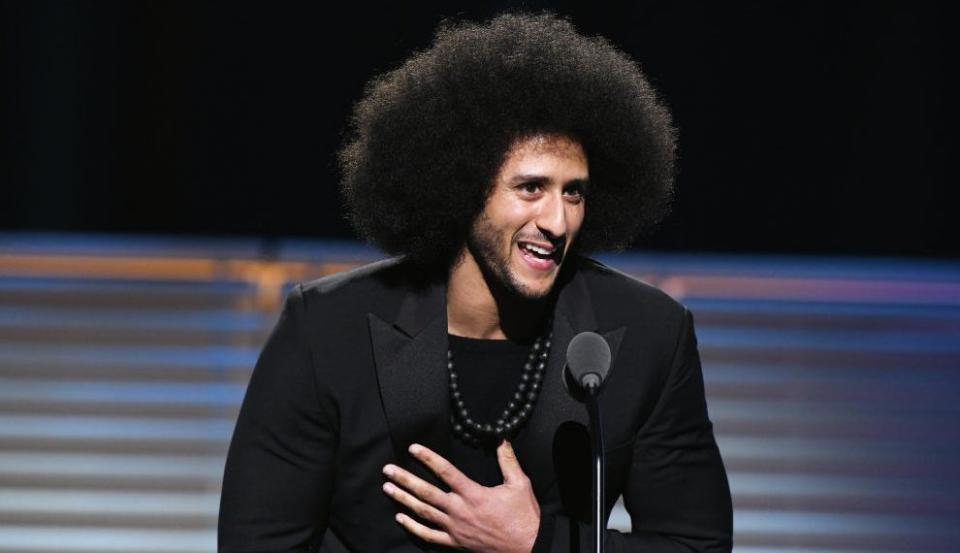Adidas wants to sign Colin Kaepernick — if an NFL team signs him
In an interview last week at Arizona State University’s inaugural Global Sport Summit, Adidas US CEO Mark King casually mentioned that Adidas would be interested in signing NFL free agent Colin Kaepernick to an endorsement deal—if he lands a contract for next football season.
“If he signs on a team, we would definitely want to sign him,” King said, according to The Arizona Republic. “We love athletes that have a platform to make the world a better place. If they’re an activist in a way that brings attention to something that moves the world forward, even if there’s controversy at that moment, we’re really interested in those athletes because I think it represents the world today.”
The comment made waves this week and was well-received by some, criticized by others. Some accused Adidas of looking to get attention without following through, even though King specifically said he was not “taking advantage of this noise or interest that he had generated.” As Golf Digest writer Matthew Rudy noted, King’s comment, whether by design or not, is functioning like a “quick and dirty focus group.”

ESPN personality Jemele Hill tweeted out a news story about King’s remark and commented, “A bigger statement would be if they signed him regardless.”
Recent NFL retiree Martellus Bennett, who raised his fist during the national anthem last season in solidarity with Kaepernick (but did not kneel), also tweeted that the company should sign Kaepernick, “regardless of an NFL deal. They’re doing deals with all these other ‘influencers’ how many have more influence than him.”
Adidas should sign @Kaepernick7 regardless of an NFL deal. They’re doing deals with all these other “influencers” how many have more influence than him.
— Martellus Bennett (@MartysaurusRex) April 17, 2018
Whether or not you agree with Bennett, he is right about Adidas and influencers. In 2016, Adidas launched its “Creators” marketing campaign, pushing the idea that all of its sponsored athletes are “individual personalities that try to carve out their own space… guys that have personality and really stand for being an individual,” as King put it in a 2016 interview with Yahoo Finance.
King cited bearded Houston Rockets star James Harden as the best example, and added that by contrast, “I think most of the athletes at Under Armour are kind of milquetoast.”
Besides Harden, the Adidas athlete stable includes Derrick Rose, Jaylen Brown, Brandon Ingram, and Jamal Murray in the NBA, Von Miller and Aaron Rodgers in the NFL, Kris Bryant, Carlos Correa, and now Aaron Judge in MLB, and soccer stars Lionel Messi and Paul Pogba.
Some could reasonably argue that if Kaepernick isn’t playing pro football, he doesn’t quite fit with the rest of the Adidas stable of sponsored athletes. While Nike has its long-standing relationship with Michael Jordan, who is retired from basketball, there’s no real Adidas equivalent of a former pro athlete who is still an Adidas ambassador, except maybe 71-year-old tennis player Stan Smith.
But Adidas has arguably gotten even more mileage from its partnerships with non-athlete influencers, like Kanye West, Pharrell Williams, Katy Perry and Stella McCartney. As Bennett’s argument goes, Kaepernick is a bona fide cultural influencer (and political icon) regardless of whether he’s active on the field.
Adidas declined to comment further on Mark King’s comments.
—
Daniel Roberts is the sports business writer at Yahoo Finance. Follow him on Twitter at @readDanwrite.
Read more:
Adidas: ‘We have really great momentum right now’
Adidas has nearly doubled its US sneaker market share—at Nike’s expense
3 big reasons Under Armour has cooled off
Adidas is Yahoo Finance sports business of the year for 2016
Adidas calls Under Armour’s athletes ‘milquetoast’
Adidas enters uncharted territory, going all in on Kanye West


